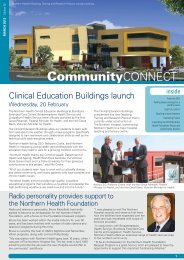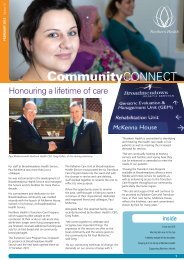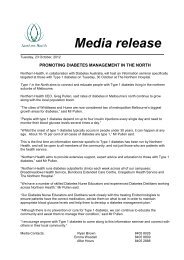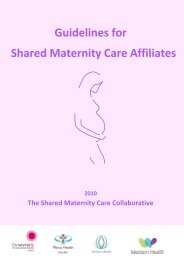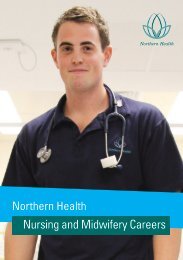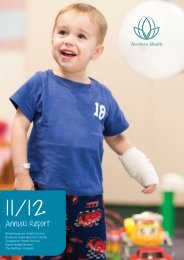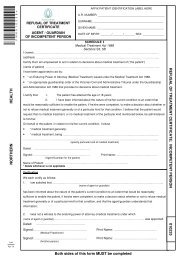ANNUAL REPORT - Northern Health
ANNUAL REPORT - Northern Health
ANNUAL REPORT - Northern Health
Create successful ePaper yourself
Turn your PDF publications into a flip-book with our unique Google optimized e-Paper software.
are now represented as patients in all 76 of <strong>Northern</strong><br />
<strong>Health</strong>’s speciality clinics. Presentations have risen from<br />
1311 attendances in 08/09 to 1527 attendances in 09/10,<br />
indicating an increasing acceptance of <strong>Northern</strong> <strong>Health</strong><br />
services by the ATSI community.<br />
The number of ATSI identified babies born at The <strong>Northern</strong><br />
Hospital has also increased during the last seven years.<br />
This can be attributed to a number of factors including the<br />
increase in the ATSI population in the catchment, better<br />
processes to identify patients who identify as Aboriginal<br />
or Torres Straight Islander, and the increasingly positive<br />
view of the ATSI community towards <strong>Northern</strong> <strong>Health</strong>. This<br />
increasingly positive view is also reflected by the gradually<br />
increasing number of Aboriginal people joining the staff at<br />
<strong>Northern</strong> <strong>Health</strong>, particularly in nursing.<br />
The <strong>Northern</strong> <strong>Health</strong> Primary Care and Population<br />
<strong>Health</strong> Advisory Committee develops annual work plans<br />
to identify population health issues and strategies to<br />
address them. <strong>Northern</strong> <strong>Health</strong> continues to support<br />
Planning for a healthier North and is working towards<br />
WHO International <strong>Health</strong> Promoting Hospital status. The<br />
committee is proposing to further develop <strong>Health</strong> Literacy as<br />
a fundamental concept in training and education.<br />
Improving services for families<br />
Local children in the Craigieburn community and surrounds<br />
have the opportunity to enhance their developmental skills<br />
with the opening of the Craigieburn <strong>Health</strong> Service Resource<br />
Library. The Resource Library, a special library of games and<br />
toys, is designed to enrich a child’s development through<br />
positive play and interaction. Children are able to enjoy<br />
playing while achieving developmental goals.<br />
Parents attending Craigieburn <strong>Health</strong> Service’s Children’s<br />
Services are able to borrow select toys and equipment to<br />
help work towards their child’s short-term goals which may<br />
focus on hand-eye coordination, strength and balance,<br />
mobility and speech and language skills. Clinicians<br />
match the right toy to a child’s specific developmental<br />
need according to their therapy program. Many of the<br />
educational toys purchased for the Resource Library are<br />
expensive and may only be needed for a short period of<br />
time to help the child develop a new skill. The Library<br />
provides an opportunity for families to enhance their child’s<br />
development through positive play and interaction, without<br />
committing to the high cost.<br />
Parents will be provided with education and fact sheets on<br />
the use of library toys and equipment. They will also be given<br />
alternative play activities using day-to-day household items<br />
and other low cost ideas. The new Resource Library is made<br />
possible thanks to a generous $5,000 donation from Variety<br />
Club and is supported by Craigieburn Sporting Club.<br />
Unique opportunities for ‘Old Blokes’<br />
The Old Blokes’ Shed, located at Bundoora Extended Care<br />
Centre is providing many new opportunities for clients to<br />
engage in rewarding rehabilitative and social activities. The<br />
Old Blokes’ Shed was built with the generous support of the<br />
Rotary Club of Bundoora.<br />
Three different sessions are run in the shed including<br />
Occupational Therapy, Planned Activity Group(PAG) and<br />
casual drop-in sessions. Occupational Therapy and PAG<br />
sessions are therapy related and run by Allied <strong>Health</strong> staff,<br />
supported by volunteers.<br />
These sessions are designed to restore or maintain a<br />
patient’s ability to perform tasks used in daily living and<br />
include activities such as woodwork, mosaic, card and board<br />
games and macramé among others.<br />
The Drop-In sessions, run by volunteers, focus on providing<br />
patients with an opportunity to socialise in a relaxed<br />
environment.<br />
09/10 <strong>Northern</strong> <strong>Health</strong> Annual Report 27



